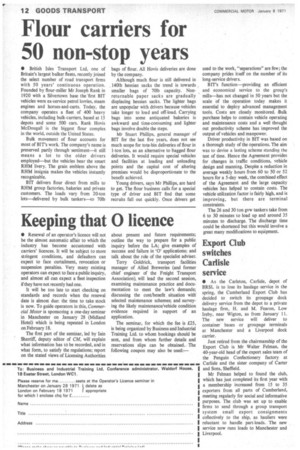Flour carriers for 50 non-stop years
Page 14

If you've noticed an error in this article please click here to report it so we can fix it.
• British Isles Transport Ltd, one of Britain's largest bulker fleets, recently joined the select number of road transport firms with 50 years' continuous operation. Founded by flour-miller Mr Joseph Rank in 1920 with a Silvertown base the 'first BIT vehicles were ex-service petrol lorries, steam engines and horses-and-carts. Today, the company operates a fleet of 400 heavy vehicles, including bulk-carriers, based at 15 depots and some 500 cars. Rank Hovis McDougall is the biggest flour complex in the world, outside the United States.
Bulk movement of flour accounts for most of BIT's work. The company's name is preserved partly through sentiment—it still means a lot to the older drivers employed—but the vehicles bear the smart RHM livery. The grain emblem above the RHM insignia makes the vehicles instantly recognizable. • BIT delivers flour direct from mills to RHM group factories, bakeries and private customers. The loads vary from 20-ton lots—delivered by bulk tankers—to 70Ib bags of flour. All Hovis deliveries are done by the company.
Although much flour is still delivered in 140Ib hessian sacks the trend is towards smaller bags of 701b capacity. Nonreturnable paper sacks are gradually displacing hessian sacks. The lighter bags are unpopular with drivers because vehicles take longer to load and off-load. Carrying bags into some antiquated bakeries is awkward and time-consuming and lighter bags involve double the steps.
Mr Stuart Phillips, general manager of BIT for the last five years, does not see much scope for tote-bin deliveries of flour in 1-ton lots, as an alternative to bagged flour deliveries. It would require special vehicles and facilities at loading and unloading points and the capital cost of altering premises would be disproportionate to the benefit achieved.
Young drivers, says Mr Phillips, are hard to get. The flour business calls for a special type of driver and BIT find that some recruits fall out quickly. Once drivers get used to the work, "separations" are few; the company prides itself on the number of its long-service drivers.
BIT's function—providing an efficient and economical service to the group's mills—has not changed in 50 years but the scale of the operation today makes it essential to deploy advanced management toots. Costs are closely monitored. 4Bulk purchase helps to contain vehicle operating and maintenance costs and a well thought out productivity scheme has improved the output of vehicles and manpower.
Driver productivity in BIT was based on a thorough study of the operations. The aim was to devise a lasting scheme standing the test of time. Hence the Agreement provides for changes in traffic conditions, vehicle design and manning. Despite a reduction in average weekly hours from 60 to 50 or 52 hours for a 5-day week, the combined effect of the Agreement and the large capacity vehicles has helped to contain costs. The vehicle utilization factor is fairly high, and is improving, but there are terminal constraints.
The 26 and 30 ton gvw tankers take from 6 to 30 minutes to load up and around 35 minutes to discharge. The discharge time could be shortened but this would involve a great many modifications to equipment.












































































































































